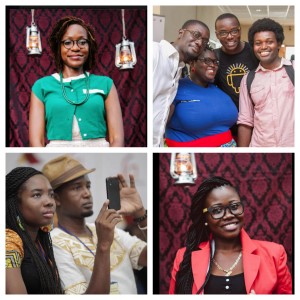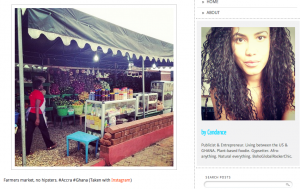Swedish-Gambian artist Seinabo Sey has become a big star in Sweden over the last year with her big voice, straightforward songs, and performances in all the important places (even Conan O’Brian). This week, she was given the prestigious closing performance slot of the Swedish music awards, the Grammis. There she also won the Pop Award of the year.
I had heard of her performance, and this evening, I decided to watch the entire awards gala. After 17 awards, finally it was time: Sey is alone on stage, lit from a spotlight above creating a beautiful classical singer aura and start singing her song “Easy”. After the wailing intro, a row of black women dressed in all black walk in to stand behind Sey, more keep coming, and more again, they are so many they fill up the stage and one row also comes in just below the stage. Sey segways into the song “Hard Time” where the lyrics go: hard time forgetting/even harder to forget/before you do same/you might regret/ The women have a neutral or even serious look on their face and “just stand there”.
It was amazing! See for yourselves!
After the performance Sey has gotten the question of what she meant by the performance. To the Swedish Television Company, SVT, she said:
– Jag vill att folk ska tänka själva. Det är konst – det är ljud och bild – och jag tror att människor gör mer när de får tänka själva än när de blir tillsagda vad de ska tänka.
– I want people to think for themselves. It is art – it is sound and image – and I think people do more when they are allowed to think for themselves than when they are told what to think.
Such a great and educative answer.
Her performance was most definitely a political statement and watching the clip from Ghana what went through my mind was: “I have never seen that many black women at once in Sweden, but they are there, they are there to stay, they are all ages, all shapes and sizes, all types of hair styles (gotta love black women!), they are there, how are they treated? How does it feel to be black in a political climate of xenophobia and outright racism? How does it feel to be a black woman in Sweden today? How will my daughters feel if they decide to live there?”
Earlier in February, I heard someone (blogger Ebba Kleeberg von Sydow?) review the Stockholm fashion week and comment there was surprisingly little political commentary in the fashion when Sweden is going through turbulent times politically. I was happy to see that did not happen to the yearly show-off of the Swedish music industry.
To use one’s platform is a requirement. Well done, Seinabo Sey.


